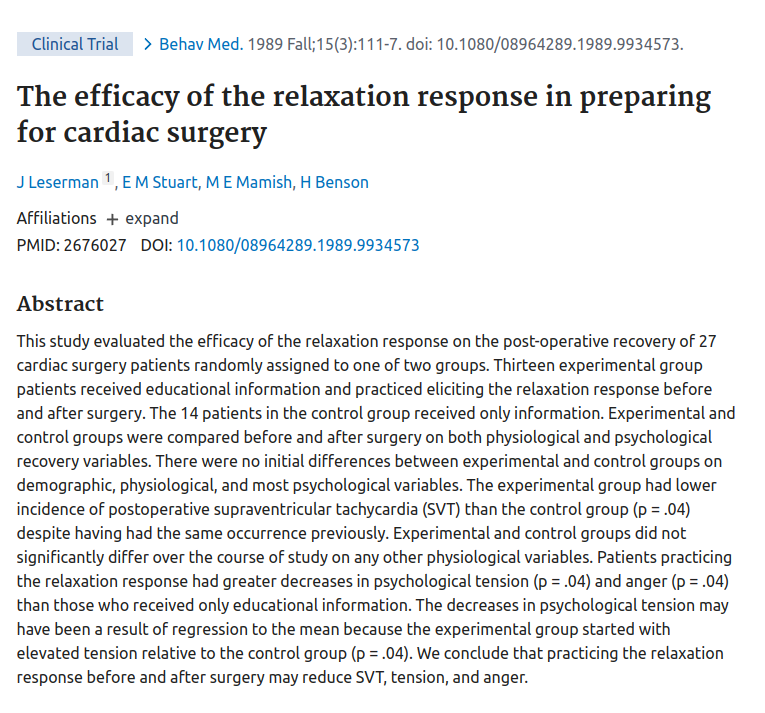This study evaluated the efficacy of the relaxation response on the postoperative recovery of 27 cardiac surgery patients randomly assigned to one of two groups. Thirteen experimental group patients received educational information and practiced eliciting the relaxation response before and after surgery. The 14 patients in the control group received only information. Experimental and control groups were compared before and after surgery on both physiological and psychological recovery variables. There were no initial differences between experimental and control groups on demographic, physiological, and most psychological variables. The experimental group had lower incidence of postoperative supraventricular tachycardia (SVT) than the control group (p = .04) despite having had the same occurrence previously. Experimental and control groups did not significantly differ over the course of study on any other physiological variables. Patients practicing the relaxation response had greater decreases in psychological tension (p = .04) and anger (p = .04) than those who received only educational information. The decreases in psychological tension may have been a result of regression to the mean because the experimental group started with elevated tension relative to the control group (p = .04). We conclude that practicing the relaxation response before and after surgery may reduce SVT, tension, and anger.
The Efficacy of the Relaxation Response in Preparing for Cardiac Surgery
Publication
Behavioral Medicine
Volume 15, Issue 3, 111-117
Abstract
Web and Email Links
Related Listings
Journal
American Journal of Public Health
A 12-week randomized experiment investigated the effects of daily relaxation breaks on office workers with “normal” blood pressure. Blood pressures of 126 volunteers from the corporate offices of a manufacturing firm were measured biweekly. After four weeks of baseline monitoring, volunteers were divided randomly into three groups: Group A was taught a technique for producing the relaxation response; Group B was “taught” to sit quietly; and Group C was taught nothing. Groups A and B w […]
Journal
Psychiatry
In the Western world today, there is a growing interest in nonpharmacological, self-induced, altered states of consciousness because of their alleged benefits of better mental and physical health and improved ability to deal with tension and stress. During the experience of one of these states, individuals claim to have feelings of increased creativity, of infinity, and of immortality; they have an evangelistic sense of mission, and report that mental physical suffering vanish (Dean). […]
Journal
PLOS ONE
Mind-body practices that elicit the relaxation response (RR) have been used worldwide for millennia to prevent and treat disease. The RR is characterized by decreased oxygen consumption, increased exhaled nitric oxide, and reduced psychological distress. It is believed to be the counterpart of the stress response that exhibits a distinct pattern of physiology and transcriptional profile. We hypothesized that RR elicitation results in characteristic gene expression changes that can be […]

